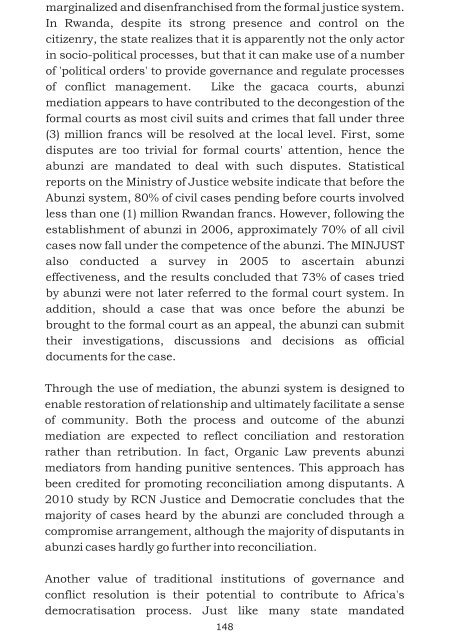Beneficiaries are actors too.pdf - Southern Institute of Peace ...
Beneficiaries are actors too.pdf - Southern Institute of Peace ...
Beneficiaries are actors too.pdf - Southern Institute of Peace ...
Create successful ePaper yourself
Turn your PDF publications into a flip-book with our unique Google optimized e-Paper software.
marginalized and disenfranchised from the formal justice system.<br />
In Rwanda, despite its strong presence and control on the<br />
citizenry, the state realizes that it is app<strong>are</strong>ntly not the only actor<br />
in socio-political processes, but that it can make use <strong>of</strong> a number<br />
<strong>of</strong> 'political orders' to provide governance and regulate processes<br />
<strong>of</strong> conflict management. Like the gacaca courts, abunzi<br />
mediation appears to have contributed to the decongestion <strong>of</strong> the<br />
formal courts as most civil suits and crimes that fall under three<br />
(3) million francs will be resolved at the local level. First, some<br />
disputes <strong>are</strong> <strong>too</strong> trivial for formal courts' attention, hence the<br />
abunzi <strong>are</strong> mandated to deal with such disputes. Statistical<br />
reports on the Ministry <strong>of</strong> Justice website indicate that before the<br />
Abunzi system, 80% <strong>of</strong> civil cases pending before courts involved<br />
less than one (1) million Rwandan francs. However, following the<br />
establishment <strong>of</strong> abunzi in 2006, approximately 70% <strong>of</strong> all civil<br />
cases now fall under the competence <strong>of</strong> the abunzi. The MINJUST<br />
also conducted a survey in 2005 to ascertain abunzi<br />
effectiveness, and the results concluded that 73% <strong>of</strong> cases tried<br />
by abunzi were not later referred to the formal court system. In<br />
addition, should a case that was once before the abunzi be<br />
brought to the formal court as an appeal, the abunzi can submit<br />
their investigations, discussions and decisions as <strong>of</strong>ficial<br />
documents for the case.<br />
Through the use <strong>of</strong> mediation, the abunzi system is designed to<br />
enable restoration <strong>of</strong> relationship and ultimately facilitate a sense<br />
<strong>of</strong> community. Both the process and outcome <strong>of</strong> the abunzi<br />
mediation <strong>are</strong> expected to reflect conciliation and restoration<br />
rather than retribution. In fact, Organic Law prevents abunzi<br />
mediators from handing punitive sentences. This approach has<br />
been credited for promoting reconciliation among disputants. A<br />
2010 study by RCN Justice and Democratie concludes that the<br />
majority <strong>of</strong> cases heard by the abunzi <strong>are</strong> concluded through a<br />
compromise arrangement, although the majority <strong>of</strong> disputants in<br />
abunzi cases hardly go further into reconciliation.<br />
Another value <strong>of</strong> traditional institutions <strong>of</strong> governance and<br />
conflict resolution is their potential to contribute to Africa's<br />
democratisation process. Just like many state mandated<br />
148


